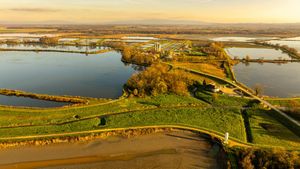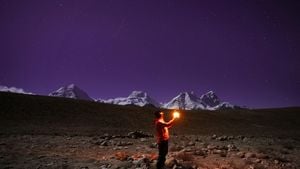Iran's nuclear ambitions are back at the forefront of international concern, following the country’s recent escalations and the subsequent Western response. The debate intensified after the International Atomic Energy Agency (IAEA) passed a resolution condemning Iran for its lack of transparency concerning its nuclear activities, leading to significant repercussions.
On Sunday, Iranian Parliament Speaker Mohammad Bagher Ghalibaf announced Iran's latest move to deploy new advanced centrifuges for uranium enrichment, marking Iran's commitment to expand its nuclear program as retaliation against the IAEA resolution. This development came after the Board of Governors of the IAEA condemned Iran for failing to clarify issues related to undeclared nuclear materials.
The IAEA motion, which garnered support from 19 member states and saw 12 abstentions, was supported by key Western allies, including the United States, France, and Germany. The resolution highlighted concerns over Iran's nuclear program and its potential threat to international security. Conversely, nations such as China, Russia, and Burkina Faso opposed the resolution, emphasizing different geopolitical priorities.
Following the IAEA's action, Ghalibaf labeled the resolution as “politically motivated” and accused Western powers of using Iran's nuclear activities to justify illegitimate actions. He articulated this during a parliamentary session, asserting, “the actions of the three European states and the U.S., which are politically motivated and detrimental, resulted in an unjust resolution.” Ghalibaf also appealed to IAEA member states to resist Western pressure and maintain diplomatic channels unscathed by political interference.
Notably, the IAEA resolution referenced Iran’s increasing stockpiles of enriched uranium, which has reportedly been enriched to levels nearing weapons-grade specifications. The agency's Director General, Rafael Grossi, indicated concern over Tehran approaching the threshold necessary for nuclear weaponization. This vulnerability has amplified fears among Western nations, citing Iran's nuclear endeavors as provocative.
Iranian officials have consistently maintained the peaceful nature of their nuclear program, insisting their operations are strictly for research and energy production. Despite these assertions, Washington and its allies remain skeptical, particularly after the breakdown of the Joint Comprehensive Plan of Action (JCPOA)—the 2015 nuclear agreement dismantled by the Trump administration's withdrawal in 2018.
Since then, Iran has gradually scaled back its compliance with nuclear restrictions outlined under the JCPOA, including enriching uranium to higher levels indiscriminately.
Iran's Foreign Minister, Abbas Araghchi, had previously warned the IAEA about the consequences of any resolution condemning the nation’s nuclear activities. He reiterated Tehran's willingness to renegotiate the JCPOA but made clear this would only occur under conditions favorable to Iran.
The increased tensions surrounding Iran's nuclear activities have culminated in calls for urgent resolutions. Earlier proposals at Western summits, including the recent IAEA meetings, emphasized the need for Iran to comply fully with its commitments under the Nuclear Non-Proliferation Treaty (NPT) to alleviate international fears.
Mirroring statements from Western leaders, Ghalibaf insisted Iran's responses were appropriately overlooked, conveying significant distrust, stating, “Their dishonesty and bad faith have disrupted the constructive atmosphere we were building for strengthened cooperation between Iran and the agency.”
Building upon the discourse, Western nations collectively expressed their dissatisfaction with Iran's response following the IAEA's condemnation. A joint statement from the U.S., France, the U.K., and Germany stated, “Iran's announcement to expand its nuclear program lacks credible, peaceful rationale,” shedding light on the growing rift between Iran and the West.
Despite the mounting pressures, Iran announced its intentions to hold talks with European powers including France, Germany, and the U.K. on November 29, indicating their willingness to engage diplomatically. This meeting, according to Esmaeil Baghaei, Iran's Foreign Ministry spokesperson, aims to tackle various regional and international challenges alongside the nuclear issue, indicating Iran’s strategy of maintaining dialogue even amid rising tensions.
Tensions, particularly those arising from Iran’s aggressive approach to its nuclear program, have caused alarm not just for neighboring countries but globally. The IAEA has insisted on continuing discussions and increasing oversight to verify Iran’s commitment to keeping its nuclear activities for peaceful purposes.
Experts indicate Iran’s advancement of its centrifuges and its increasing uranium stockpiles could lead to categorizations rising closer to threshold levels. Behrouz Kamalvandi, spokesperson for Iran's Atomic Energy Organization, has conveyed confidence about the situation, stating, “We will substantially increase the enrichment capacity with the utilization of different types of advanced machines.” He pointedly advised caution to Western nations, inferring the geopolitical board has shifted and the balance is precarious.
The Western nations' urgency is underscored by their descending dialogue with Iran, reminiscent of the tense negotiations preceding the JCPOA. Observers note the revitalization of Iran's ambitions could lead the geopolitical discourse back to the brink, stirring fears of nuclear proliferation.
Compounding the situation, the legacy of nuclear diplomacy remains severely threatened by Iran’s assertions and international counterparts’ reactions. It sets the stage for possible escalations if Iran continues on its current path without substantial negotiation outcomes.
Iran's return to the forefront of nuclear discussions sends ripples through international relations, forcing nations to reevaluate their strategic positions on nuclear proliferation and regional security as they weigh the consequences of Iran's nuclear developments amid reescalated scrutiny.



